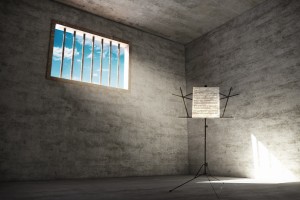There are certain sounds that most of us associate with prisons: the metal clank of a cell door closing, the thud of heavy-booted corrections officers walking the corridors, the voices of angry prisoners echoing against the bare cement walls.
 What you might not expect, however, are four-part vocal harmonies.
What you might not expect, however, are four-part vocal harmonies.
At the Iowa Medical and Classification Center in Coralville, known by most as Oakdale Prison, a choir composed of both prisoners and volunteers from nearby communities has been performing in the facility’s gym for six years.
The program was the brainchild of Mary Cohen, an elementary school teacher in Kansas. Having heard of a similar program at the Lansing Correctional Facility in that state, Cohen was moved to re-enroll in school, obtaining a doctorate in music education. She now serves as an associate professor at the University of Iowa, where she created a graduate seminar that serves as the basis for the Oakdale Community Choir.
“That was where I started digging into, what does it mean to have a choir in the prison?” Cohen says in an interview with the Cedar Rapids Gazette. “And it boils down to restorative justice and transformative justice.”
Cohen is currently performing a two-part research project on the impact the choir is having on prisoners. The first part of the study looks at how choir membership is affecting the men in prison. Later, she hopes to gauge how being a part of the choir has changed those who have since been released.
Early results show that prisoners who take part in the choir are more likely to get involved in other in-prison programming. Cohen also says that it is having a positive impact on the family lives of some of the choir members.
“It was the choir concert that motivated [one prisoner’s] dad and sister to come to Coralville and attend,” Cohen says of one man who had not had a visitor in seven years. “Now they have come to three or four concerts.”
In a video describing the Oakdale Community Choir, Cohen talks about the reaction of many people who attend one of the performances for the first time. “When they come to a concert,” she says, “many people have shared with me, ‘Mary, I didn’t know prisoners were people.’ And if people in our society have that distant of a concept of people who are incarcerated, it’s going to be extremely difficult to make a positive change in our society with the correctional system.”
In prisons across the country, there are men and women who struggle with self-worth—with who they are, what they’ve done, and what they hope to become. Programs like the Oakdale Choir help them to understand that they are more than the crime they’ve committed, with talents and skills that can benefit and enrich others.
With the help of volunteers and the support of churches across the country, Prison Fellowship reminds those behind bars that they are of infinite worth, loved by God, with gifts given by Him to serve those around them. If you would like to learn more about how you can serve those in prison as an in-prison volunteer or mentor, visit our volunteer page.